
We can discover countless stories on the cobblestone streets, through the colorful houses and between the towers of this old fortress. There are few destinations in this world that stir up so many emotions and experiences like Sighișoara Citadel, a magical place that transcends time and can take us to distant times. Modern civilization seems to end before the walls of the marvelous Sighișoara Citadel that withstands for centuries as one of the few medieval fortresses of Europe that was continuously inhabited!
Included in the UNESCO World Heritage, Sighișoara offers a complex and fascinating experience, with an unbelievably rich heritage of historical buildings and interesting monuments, but also with an authentic atmosphere that cannot be replicated. According to UNESCO, Sighișoara is an outstanding testimony to the culture of the Transylvanian Saxons, a culture that is beginning to fade after 850 years and will continue to exist only through its architectural and urban monuments. The town of Sighișoara is located in the hills of central Transylvania, along the valley of Târnava Mare River. Today, the citadel of Sighișoara silently endures above the new city, its enchanting streets being invaded by tourists for half a year.

The story of the Sighișoara citadel seems to start with the arrival of the Saxons from Germany after the invitation of the Hungarian king in order to defend the kingdom’s eastern border. A settlement was attested on this place since the end of the 12th century, while only a century later historical documents highlight a town built upon a former Roman fort. Through the ages, the town was known under several names, Sighișoara appearing for the first time in a document of Vlad Dracul, the father of Vlad Țepeș, who lived in exile here.
During the period of maximum development of the fortress, it used to be one of the most important commercial and crafting centers of all Transylvania, with about 15 known guilds, most of them belonging to Transylvanian Saxons. They were also behind the building of the fortifications that surround the old town, one of its defining elements being the towers that bear the name of the old guilds.
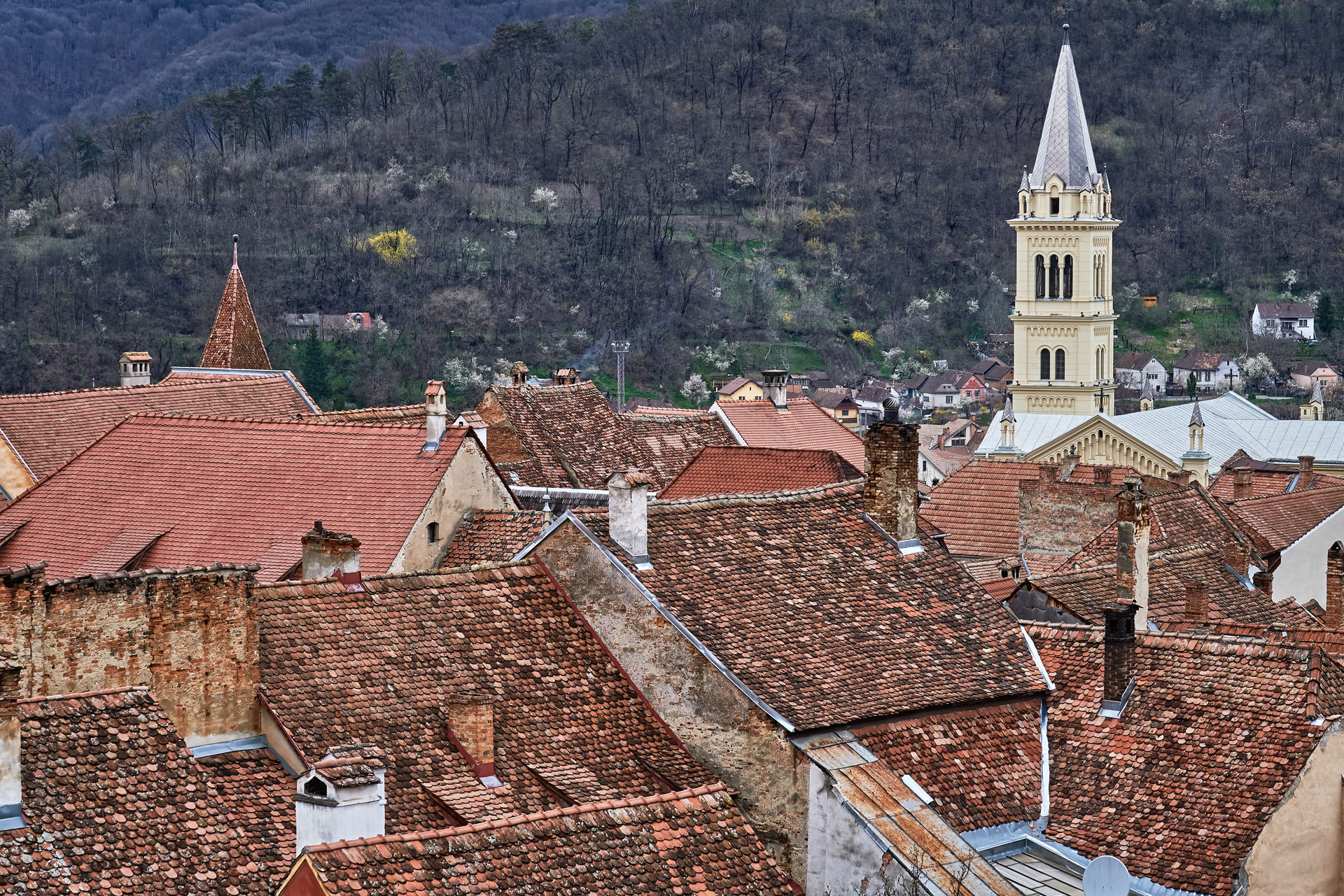


We can start our visit from the large parking lot on the southern side, below the fortress, by ascending a long set of stairs towards the first important monument and one of the symbols of Sighișoara, the Clock Tower. Of the 14 initial towers of the citadel, only 9 are still preserved and the Clock Tower is the biggest and most interesting. Rising at 64 meters, it dominates the surrounding area and can be seen from almost anywhere in town, while the views from its upper balcony are truly astonishing. The most fascinating element of the tower is the large clock created in 1648, its inner mechanism being replaced in 1906 with a newer Swiss one.
Next to the clock, there is a series of figurines with a height of 80 cm, showing the days of the week, as well as other smaller ones. Made from basswood and personifying ancient gods, these figurines bring a certain exotic charm to the already impressive monument. Since the beginning of the 19th century, the tower has housed the History Museum of Sighișoara that occupies all of the floors, with several collections that include archeology, art, pharmacy, ethnography, guilds, weapons and others. At the last level, we can admire an interesting horology collection, as well as the mechanism of the watch with its figurines.


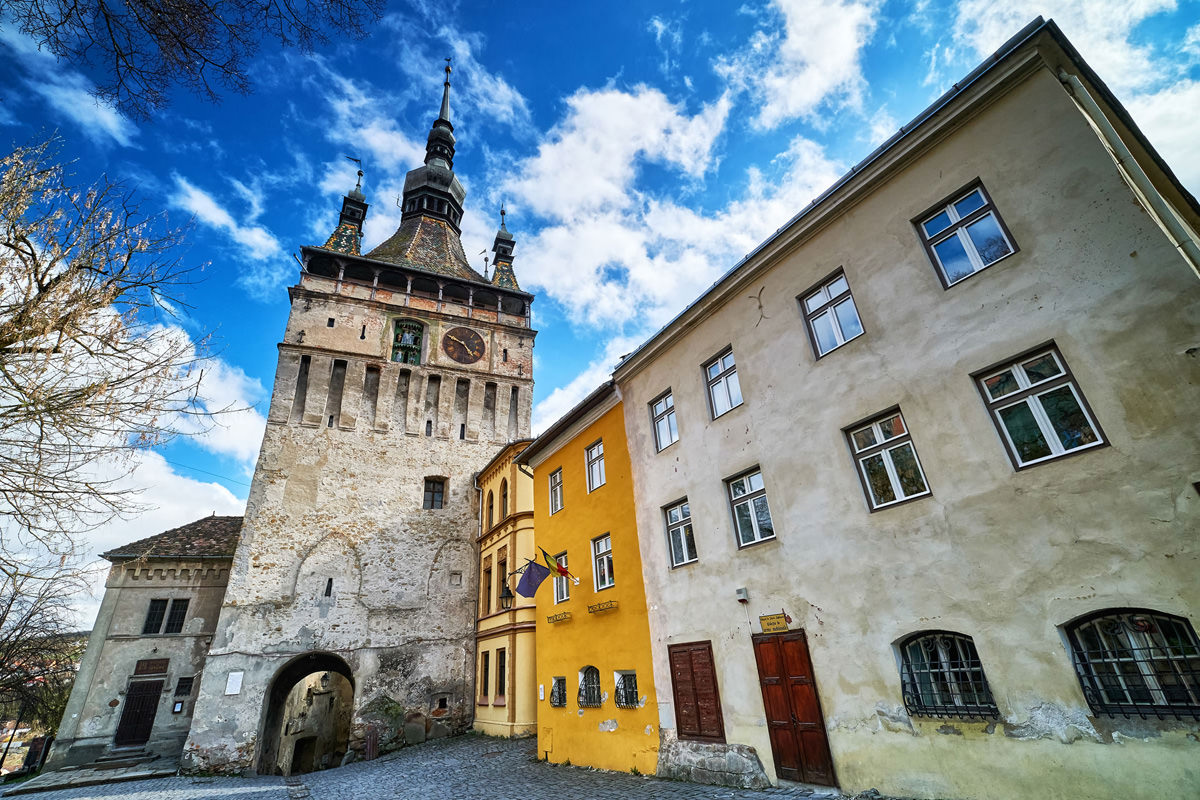
The charming small square behind is known as the Museum Square, being surrounded by beautiful medieval monuments. At its core sits the imposing Monastery Church, which was once part of the Dominican monastery abolished in 1556. The splendid Gothic church was built between 1492 and 1515 over an older Dominican church. It has many valuable religious artifacts, with its central element being the ornate altar piece dating from 1680.
The Blacksmiths’ Tower can be found behind the church, built in 1631 on the spot of the former Barbers’ Tower. It seems rather short from the fortress, as it actually extends downwards along the wall. Before continuing towards the nearby Citadel Square, one of the less known monuments is the Vlad Dracul’s House, the son of Mircea the Elder and the father of the famous Vlad Țepeș. It is believed that he stayed in this house until the age of four, while it currently houses a restaurant and two rooms established as a small museum, but without interesting elements. The Venetian House is also here, featuring beautiful neo-gothic architecture.
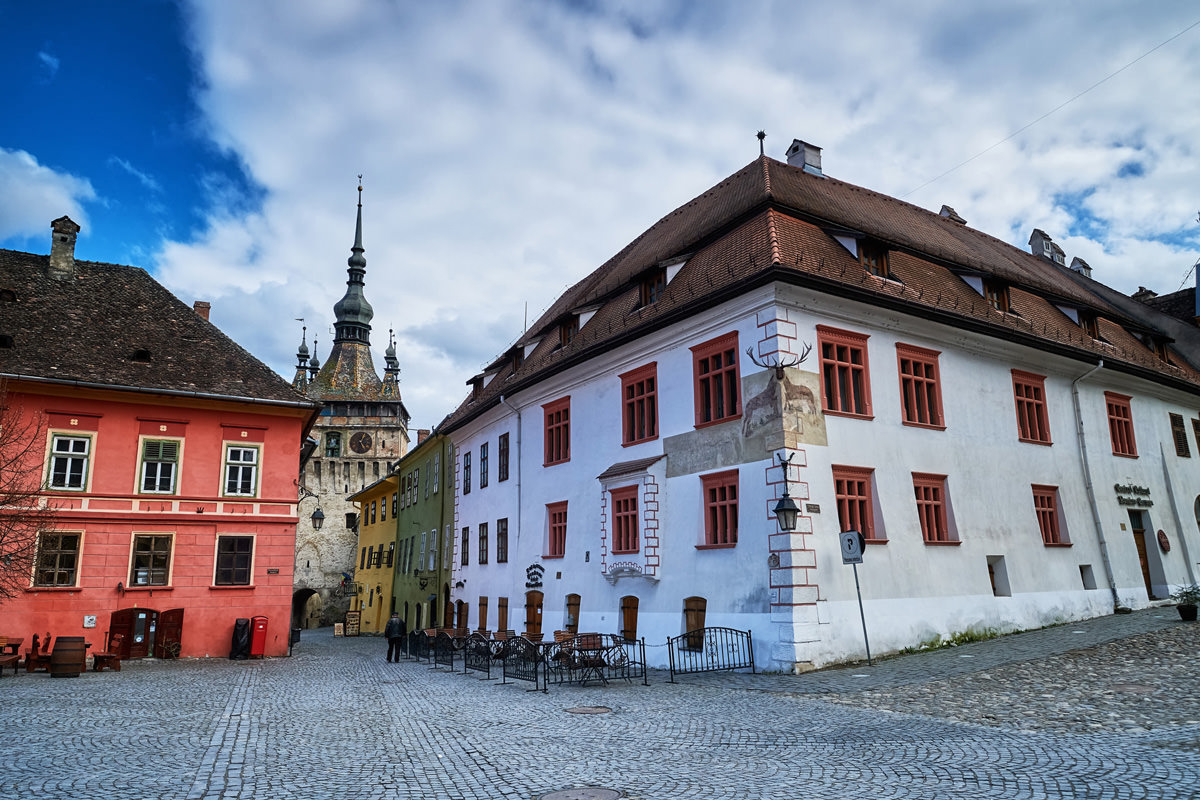
The small and lovely Citadel Square can be considered the central point of the old town, surrounded by medieval buildings that currently house hotels or souvenir shops. The most interesting is the Stag House, named after the mural painting with its impressive trophy of a Carpathian stag. Over the centuries, the house was inhabited by the most important families of the fortress, currently housing a guesthouse and a traditional Romanian restaurant.
From the square, we can take School Street towards the hill where the imposing Hill Church can be seen. Before beginning to climb, we can stop to visit The Dracula Investigation, a unique museum where we can unravel the true story of the medieval ruler who became a universal legend. Two other monuments can be admired a little to the south. The Tinsmiths’ Tower and the Tanners’ Tower date from the same time as the walls.
To ascend towards the church, we can follow the dark tunnel of the Covered Stairway, also known as the Scholars’ Stairway. These wooden stairs were covered at the end of the 19th century to protect the children that went to the school uphill during rainy or snowy days. The 176 wooden stairs create the feeling of traveling through time, a touching experience for anyone. Stepping outside the stairway, the surrounding atmosphere is almost magical, with old monuments bearing the mark of history.

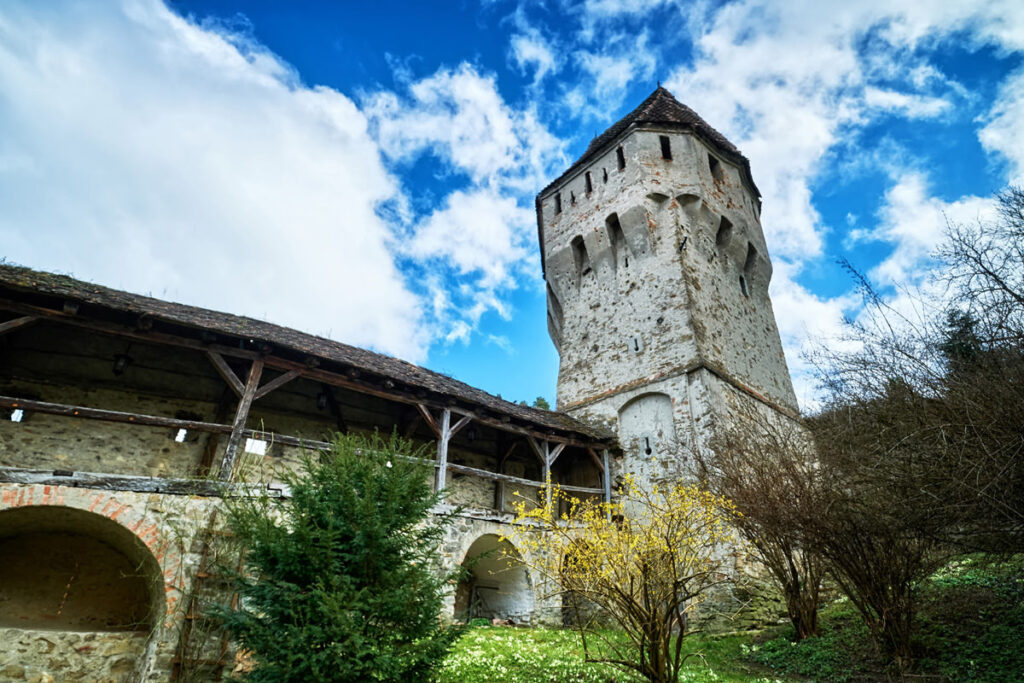

The first monument on the left is the old School on the Hill, now known as the Joseph Haltrich Highschool. First mentioned in 1522, it is one of the oldest schools in Transylvania, passing through several transformations over the years. The hill is dominated by the imposing silhouette of the St. Nicolas Church, also known as the Hill Church.
Built in a gothic style through several stages between 1345 and 1525, the evangelical church includes a Roman chapel and a keep, while the crooked belltower rises at over 40 meters. Among the most interesting features, this is the only location in Transylvania that includes an underground crypt and it also has superb interior paintings from the 15th century that were discovered during the last renovation.
Close to the church there is another defense tower known as the Ropemakers’ Tower, dating from the same time as the fortress walls, being rebuilt in 1350 and the last one still inhabited. The western part of the hill is occupied by the old cemetery, a space with a special atmosphere, surrounded by trees and covered by the patina of time. The gravestones show the true age of this space and the customs of those times, some having symbols that show the profession of the deceased.




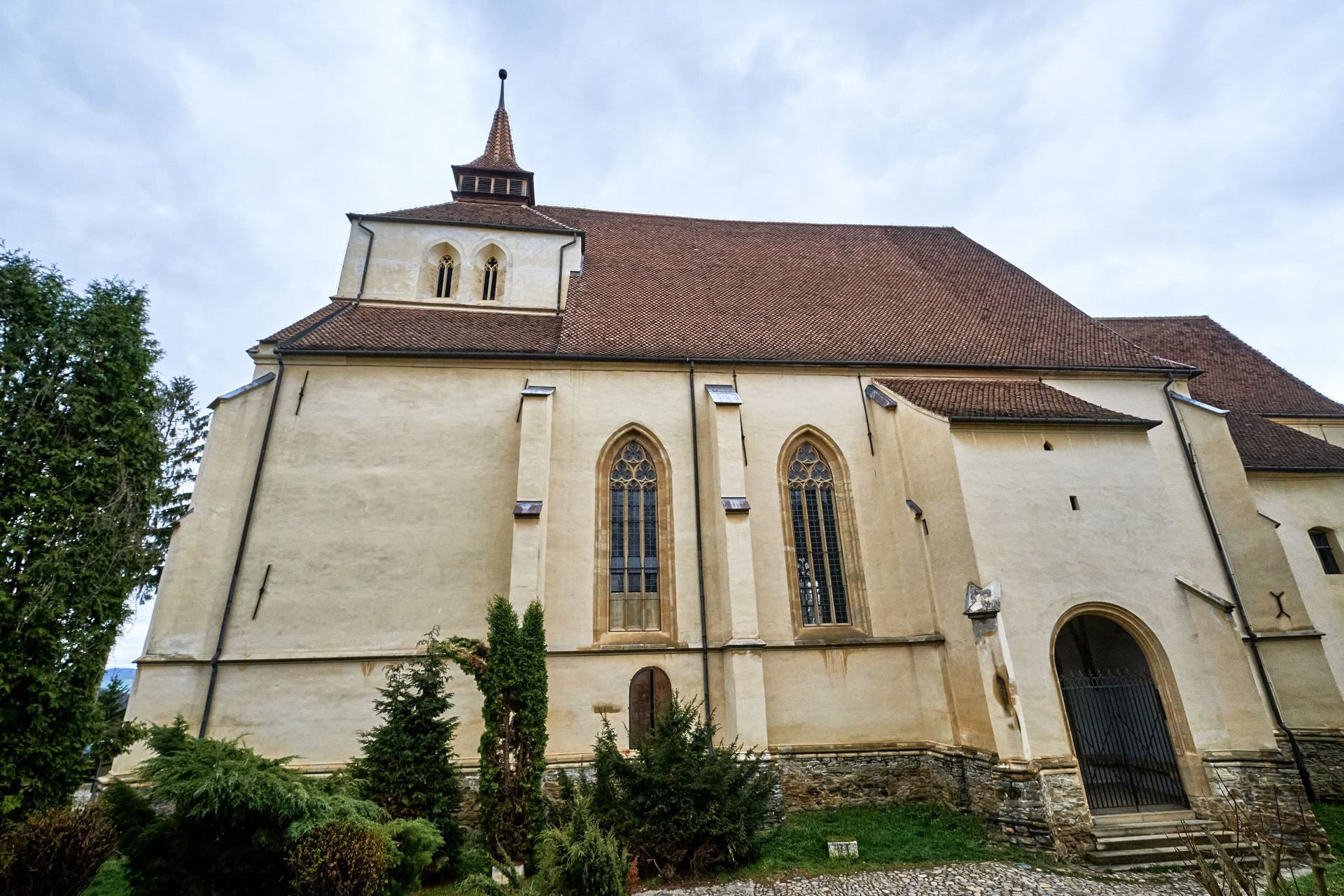
To descend back into the fortress, we can follow another route along the little Stairs’ Alley, then continue towards the hidden Butchers’ Tower, dating from the 15th century and located in a rather remote and overlooked corner of town. Also, the adjacent Furriers’ Tower guards the same Torle Gate where the inhabitants used to do the splitting of the herds. Walking along the Citadel Wall or Carpenters Street, we can reach one of the most interesting old monuments in the city, the Tailors’ Tower that was built during the 14th century and rebuilt after it exploded during the great fire of 1676.
The tower used to defend the second gate of the fortress, located underneath its two levels. From here, continuing along Carpenters St. towards the east, we can reach the small square with the Petofi Sandor memorial, located between the Cobblers’ Tower and the Roman-Catholic church. The tower is pretty short compared to the others but has a distinct charm. The present look dates from 1681 and currently houses the local radio station.
The St. Joseph Roman-Catholic Cathedral is a newer, yet graceful monument, built in 1894 after the abolishment of the Franciscan monastery and the Locksmiths’ Tower. On the way back to the Clock Tower, we can also stop to admire the building that houses the Town Hall of Sighișoara, built at the end of 19th century on the site of the former Dominican Monastery and of a lost tower.
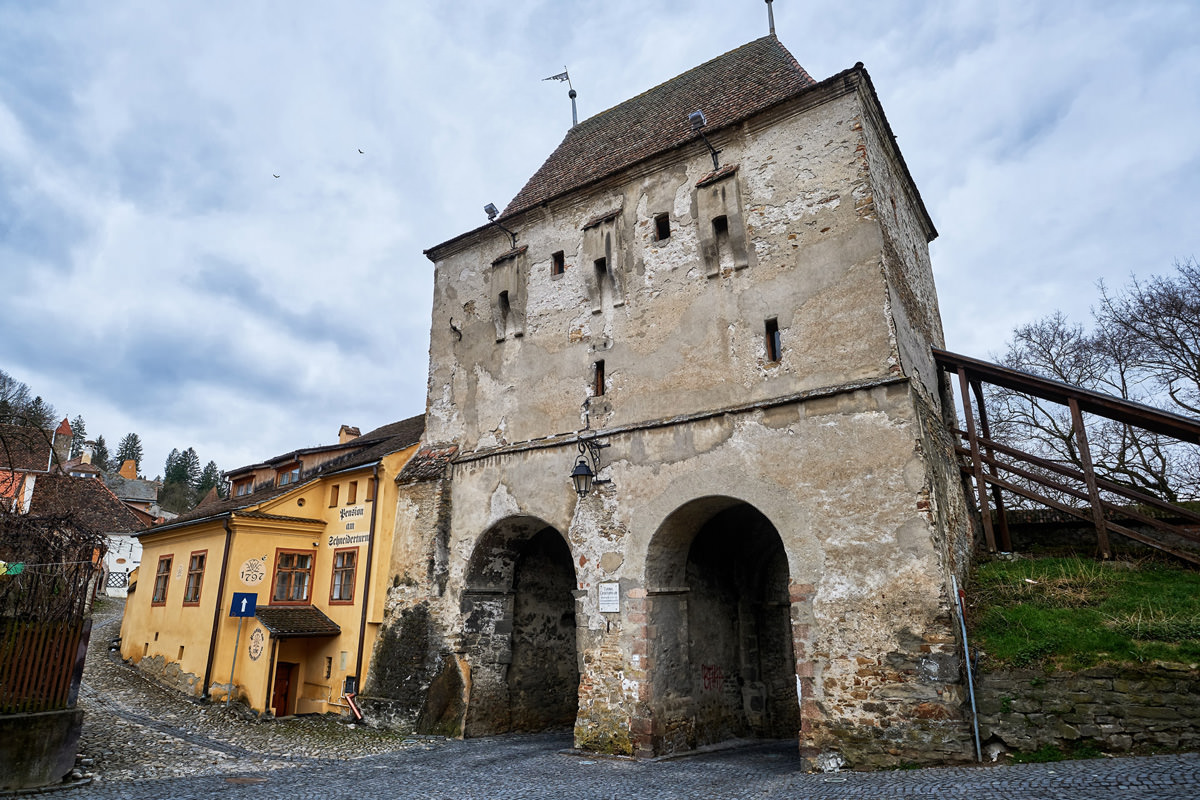


Besides these magnificent monuments that dominate the fortress, the old authentic medieval houses are worth mentioning and they can be admired along the picturesque streets. Inhabited mostly by the craftsmen and their families, they feature a special diversity of architectural styles and ornamental elements. The pastel colors and flowery windows greatly increase the delightful ambiance of the citadel, with many of them still inhabited, while others have been turned into guesthouses, restaurants, crafting workshops or souvenir shops.
For a truly unique experience, the fortress should be visited during the annual Sighișoara Medieval Festival that usually takes place at the end of July. During this awesome event, the streets are brought to life by medieval music and dancing, fighting reenactments, medieval costume parades, art and theater workshops, traditional craftsmen and local producers, as well as tourist crowds that arrive for this amazing celebration.
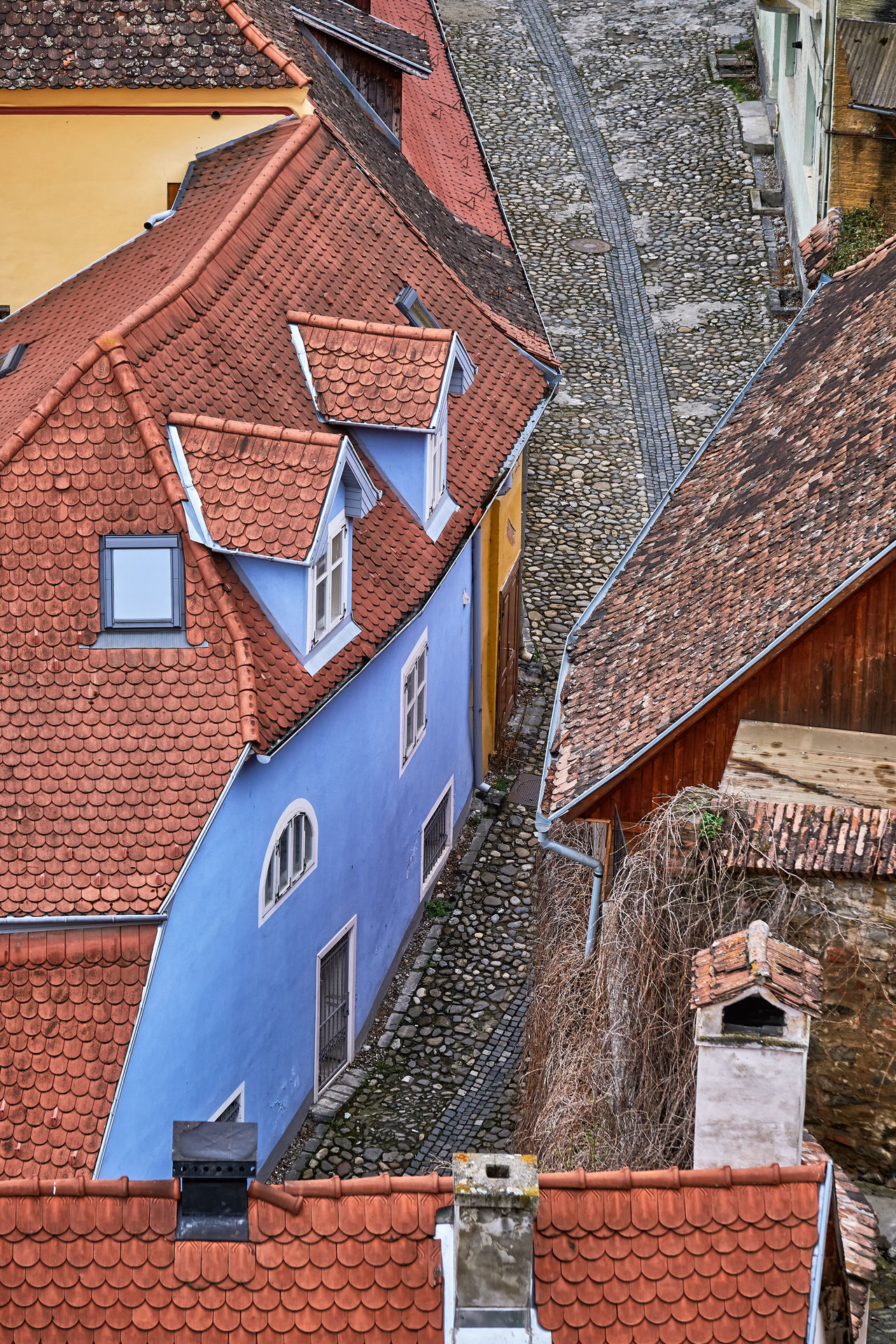


BEST ACCOMMODATION IN SIGHISOARA
Cositorarului Pension 4*
9.0 Rating from 931 Reviews!
Conveniently located in the heart of the citadel, this astonishing guesthouse features superb medieval decorated rooms, a restaurant, a café/lounge and an outdoor terrace!
Taschler Haus 4*
9.9 Rating from 419 Reviews!
One of the most prestigious and unique accommodations in Sighișoara, this outstanding guesthouse features unique room design and perfect amenities, being extremely appreciated!
Gasthaus Alte Post 3*
9.2 Rating from 1423 Reviews!
This splendid guesthouse is located right in the heart of medieval Sighișoara, featuring amazing rooms, a delicious traditional restaurant, a terrace a garden and a wine cellar!

BEST RESTAURANTS IN SIGHISOARA
- Gasthaus Altepost – Located in the center of Sighișoara, this prestigious establishment offers excellent Romanian food in an extremely authentic atmosphere. The restaurant features a wine cellar, an outdoor terrace and a pizza atelier.
- La Perla Restaurant – Located in the Lower Town of Sighișoara, just a few steps from the Clock Tower, this amazing restaurant offers traditional Romanian food, burgers, pizza and desserts, with both indoor and outdoor spaces.
- Joseph T Restaurant – A exquisite fine dining experience in Sighișoara, this restaurant and wine bar is located at the base level of the Central Park Hotel, featuring delicious Romanian and international recipes.
- Michelangelo Italian Restaurant – One of the most appreciated locations in Sighișoara, this Italian restaurant offers an authentic menu that includes delicious pasta and meat recipes, sweets and amazing wines!
- Medieval Café – Located right in the heart of the Old Town Sighișoara, this café and restaurant is well-reviewed and features a charming medieval atmosphere, as well as amazing recipes, including medieval ones!
- The Bean Specialty Coffee – Travelers that fancy a taste of a heavenly freshly roasted coffee cup can find it at The Bean Specialty Coffee, located right in the center of the old citadel.